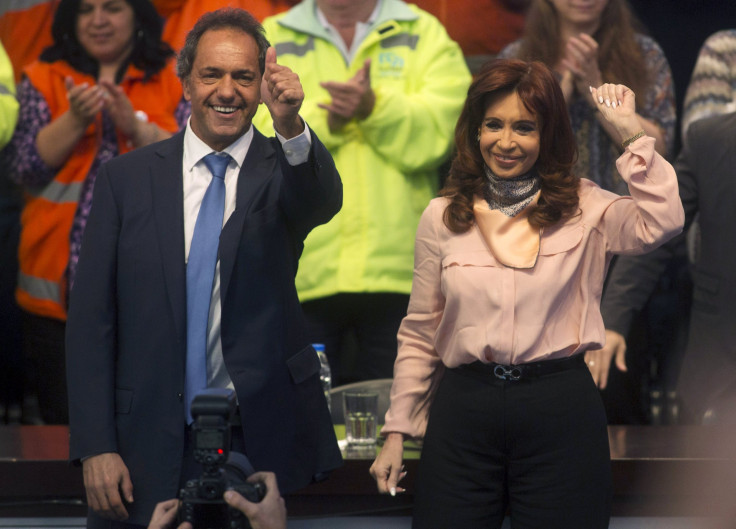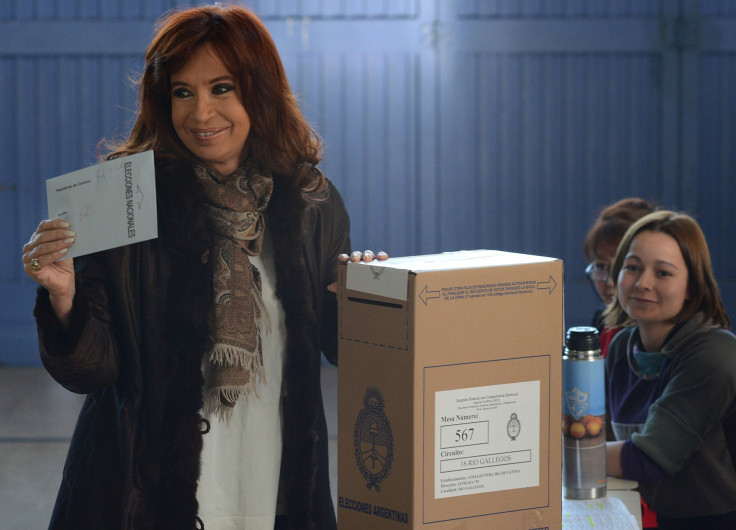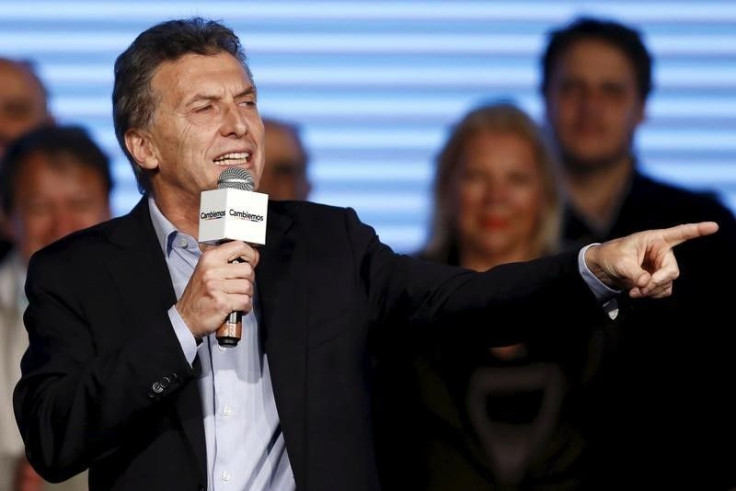Argentina Election 2015: Next President Will Inherit A Flailing Economy

For the first time in more than a decade, Argentines casting their vote for president Sunday will find one familiar name missing from their ballots. Sunday's election will close the curtain on the era of the Kirchners, the power couple that secured the presidency with landslide victories in the last three elections, first with the late President Néstor Kirchner and then two terms with his wife, current President Cristina Fernández de Kirchner, who is constitutionally barred from running again. With a new slate of candidates, the vote will come down to the numbers as the margin of victory will determine whether it could go to a runoff.
Clinching the win will be the easiest part, however. Whoever eventually ascends to the presidency will inherit what economists say are the consequences of 12 years of Kirchner policies: double-digit inflation, an overvalued currency, slumping exports and critically low foreign reserves, all of which threaten to send the country careening into financial chaos if left unaddressed.
The presidential front-runners are Daniel Scioli, a member of Kirchner’s center-left Justicialist party, who is currently leading the polls, and Mauricio Macri, a business-friendly challenger from the opposition alliance We Can Change and outgoing mayor of Buenos Aires. A third candidate, Sergio Massa, who was once allied with the president’s party but since defected to form his own, is also in the running at third place in the polls.
The winner will be tasked with pushing forward unpopular measures to put the ailing economy back on solid footing. That could include spending cuts and a painful currency devaluation that would depress wages, spelling tough times ahead for Argentina’s public.
An even bigger challenge will be negotiating the government’s decade-old debt impasse that has effectively blocked it from foreign capital markets, which it needs as its foreign reserves have shrunk to around $27 billion, only half of which is estimated to be readily accessible. The government has been mired in a protracted battle with a group of U.S.-based hedge funds over a share of its remaining sovereign debt, which Argentina defaulted on in 2001. The hedge funds have refused to accept a restructured debt, and the ensuing legal fight has prevented Argentina from being able to borrow funds without taking on high interest rates.

Analysts say all these measures are necessary to bring Argentina back from the brink as heavy state interventionism and high public spending, hallmarks of Kirchner’s economic policies, have set the country on an unsustainable path. The budget deficit now makes up around 7 percent of Argentina’s GDP, and inflation has climbed to around 25 percent, according to some independent calculations, as the government implemented tight currency exchange controls to prevent capital flight, which resulted in a thriving black market for foreign currency.
Economic slowdowns in Brazil and China, Argentina’s top two export destinations, have only compounded the pain. Dwindling revenues have left the country on track for just 0.4 percent growth for 2015, with a recession predicted for next year, according to recent projections by the International Monetary Fund.
Kirchner has drawn public support for expanding social programs and benefits for low-income Argentines. But critics say she avoided making hard choices during her presidency, such as lifting price ceilings and cutting generous energy subsidies or benefits for public-sector workers, all of which might have helped stem current financial problems but would have drawn backlash from supporters.
Scioli belongs to Kirchner’s party, but his economic advisers have advocated for more business-friendly policies, including a gradual easing of currency controls to rein in inflation, said Ignacio Labaqui, an Argentina-based senior analyst at international consulting firm Global Medley Advisors. But there’s still heavy uncertainty about how much change Scioli would bring about once in office. “[Investors] don’t know if he will move away from current policies, or do it willingly,” he said.
In public, Scioli has remained vague on his economic approach in a bid to court both the government’s supporters, who want reassurance that he won’t reduce social benefits, and the business community, which seeks a more market-friendly alternative to Kirchner’s policies.

“Effectively, the message Scioli has been sending to Cristina Fernández’s supporters is: ‘I’m not going to change much,’ and the message to centrists is, ‘Don’t worry, once I get in office I’m going to be my own man,’” said Mark P. Jones, an Argentina expert and political science fellow at the Baker Institute for Public Policy think tank at Rice University in Texas. “The real dilemma for observers is: Which Daniel Scioli is going to be president?”
Macri, on the other hand, has been a favorite of international investors, who anticipate he would be more agreeable than Scioli on a deal with the debt holdouts, and pursue a faster, more aggressive approach in weaning Argentina off the currency controls. But he would face a legislature dominated by opposing parties, which have prompted criticisms that a Macri presidency would be plagued by gridlock.
Macri has been trailing Scioli by around 10 percentage points, but Sunday’s numbers will make all the difference in who emerges triumphant. By Argentine law, a presidential candidate has to get 45 percent of the vote in the first round to win outright, or else get at least 40 percent of the vote with a 10-point lead over the runner-up. If not, the vote will go to a runoff, which would be in late November.
Scioli is not expected to get the needed 45 percent for a sweeping win, and his lead over Macri is hovering around the minimum he needs. If he can’t pull up enough support in the first round of elections, Macri is expected to form an alliance with the third-place candidate, Massa, to challenge Scioli in the runoff, and that partnership could tip the scale back in Macri’s favor.
In the meantime, Kirchner, who will be eligible to run for the presidency again in 2019, is leaving office with her popularity largely intact. She still enjoys strong support from rural and working-class Argentines who have seen their wages and standards of living rise during her presidency. Her approval rating stood at around 38 percent in August, which is an “unprecedented” high compared to previous outgoing presidents, Jones said.
“All the things [she] has been doing have been digging a deeper and deeper hole for Argentines to climb out of,” he said. “But she’s not the one that will have to make Argentina take its medicine. That will be her successor.”
© Copyright IBTimes 2024. All rights reserved.





















